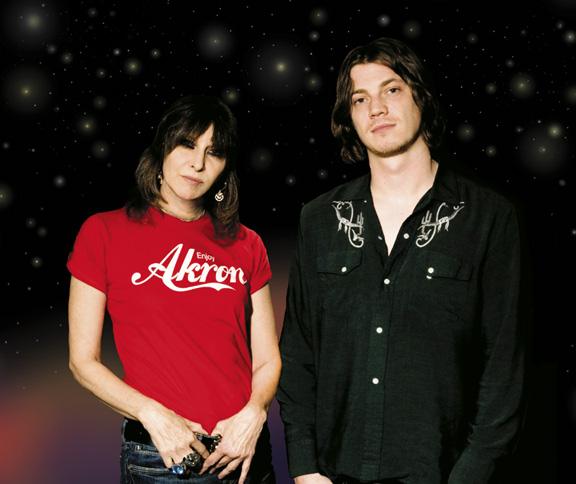Originally published in Arthur No. 32 (December 2008) (web-only, print issue cancelled)

For the Pretenders’ Chrissie Hynde, Akron, Ohio has always been a hometown in permanent decline, a place she fled for England. Now America’s greatest ex-pat rock ‘n’ roller sees the future in her past: a reborn urban core where counter-culture businesses, including her own new restaurant (vegan, of course), are helping restore progressive community to a downtown trashed by short-sighted greed. That sense of small-is-better renewal runs through her band’s new album, which features the playing of James Walbourne, an acclaimed young rockabilly guitarist who joins Hynde here for an exclusive conversation with Arthur’s Oliver Hall.
Photography by Lauren Bilanko.
Chrissie Hynde is in Hollywood on a short promotional tour of the United States to promote the new Pretenders album, Break Up the Concrete, which comes with a piece of seed paper that will grow flowers. Hynde likes to joke that the paper contains high-quality cannabis seeds, but my feverish experiments have yielded naught, perhaps because the “soil” in my neighborhood is plaster sand and the “water” is pure chlorine bleach. Just the sort of ungreen conditions of city life that Hynde wants to break up. Accompanying her on this trip is the Pretenders’ brilliant new guitarist, James Walbourne, fresh off of stints playing with The Pogues and Jerry Lee Lewis. Walbourne, a contagiously excited Brit in his late 20s, is about to join us here in their hotel room, and Hynde wants to make sure I’m going to bring him into the conversation when he arrives. “This magazine is different, so you don’t have to do the Chrissie Hynde Story,” she says.
For this tour Hynde and Walbourne have been playing mostly acoustic sets in radio stations and record stores. In L. A., they played at Amoeba Music and made an unannounced appearance at the McCabe’s Guitar Shop 50th anniversary show at UCLA. They briefly shook up the sleepy programming at KCRW, and I met them shortly after they’d performed on Sex Pistol Steve Jones’s local radio show, Jonesy’s Jukebox. At Amoeba, Hynde took the stage and declared “I’m a wreck” before undoing the top button of her jeans. The Amoeba show and the KCRW appearance were delivered from a fiery fuck-you-it’s-live point of view. The shows were a thrill, since Hynde’s voice sounds gorgeous as ever, and because if she occasionally got lost trying to remember one of her lyrics—which is not hard to do when your lyrics have as many non sequiturs as a Beckett play—Walbourne would improvise their way back to the song.
Chrissie Hynde’s voice as a writer and a singer is a hell of a thing. You could talk about the dramatic range of a voice that can sneer “You’re gonna make some plastic surgeon a rich man” and break your heart with “Kid” on the same album, or you could talk about her expert control of tone and pitch and the effect of her voice on an audience, or you could talk about her vocal tremolo, which immediately distinguishes her from other rock singers—you could talk about all these things, and I hope that you will, but the cold fact remains: your band will never, ever be able to pull off “Tattooed Love Boys.” For my part, I suspect that Hynde’s performances are so emotionally affecting because she has never given up on the hard work of trying to imagine a public domain in which she and her art and her bandmates and her audience might more perfectly coexist. On their 1984 recording of Hynde’s song “My City Was Gone,” the Pretenders depict what it feels like to return home and find yourself in an urban-renewalized ghost town, where all local distinguishing marks have been erased or paved over, and everyone works at the same shopping mall. I imagine that if the late, great radical environmentalist Edward Abbey were still above ground, he would be merrily whistling the new Pretenders song “Break up the Concrete” while jackhammering up great chunks of the interstate and throwing beer cans heedlessly over his shoulder.
Continue reading


